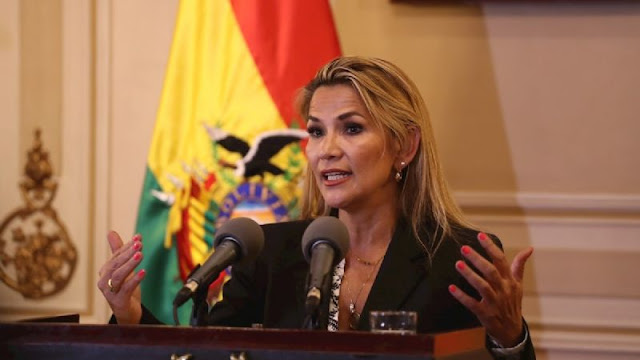The former president recalled that the TCP recognized and extended her mandate as president of the country. She also pointed out that she was recognized by countries allied to Evo Morales.
Former president Jeanine Añez addressed the magistrates of the Plurinational Constitutional Tribunal (TCP) in a letter in which she exposed five elements that, she assures, opened the way to the presidential succession and validated her mandate as constitutional president of Bolivia. In this context, she rejected the crimes for which she is being prosecuted before the ordinary justice system.
The former president asks the TCP to resolve the Concrete Unconstitutionality Action she filed against Articles 153 and 154 of the Penal Code referring to the crimes of "resolutions contrary to the Constitution and the laws" and "breach of duties" and to ratify the constitutionality of her government.
"Next, I remind you of the history that you know, and that today you intend to bury, detailing: 1) the context of the crisis of 2019; 2) the international recognition to my government management; 3) the institutional recognition to my constitutional management; 4) the demonstration that it corresponded to me to assume the presidency of the Senate in November 2019; and 5) remind you that if you accept that I had violated the Constitution, well, you would be my main accomplices, because you communicated that the immediate succession corresponded, received me personally, admitted my presidential resources, and recognized and extended my mandate", reads the missive.
1) The crisis of 2019
Añez recalls that the crisis of 2019 had its origin in the maneuvers carried out by former President Evo Morales in search of a third and later fourth term in office when the Political Constitution of the State promulgated by him only guaranteed two terms.
The former president emphasized that Morales even ignored the binding referendum of February 21, 2016 to run again for the presidency under the argument that it was his "human right" and indicated that the former president himself announced the annulment of the 2019 elections.
In Añez's opinion, this action represents the recognition of the fraud and irregularities detected by the OAS audit that his government had requested.
Añez maintains that his constitutional succession was given before the resignation of Morales, who "ordered to empty the constitutional succession".
2) International recognition
The former president emphasized that her succession was recognized by the international community, the United Nations, the OAS, the European Union, countries of the region and even by governments allied with former president Morales, such as Russia and China.
3) Institutional recognition
Añez also stressed that the Bolivian State institutions, including the Supreme Court of Justice, the new Supreme Electoral Tribunal and the departmental electoral tribunals, the Public Prosecutor's Office, the Ombudsman's Office, governors' and mayors' offices, among others, recognized the constitutional succession.
However, he pointed out that the most important recognition was from the TCP and the Plurinational Legislative Assembly (ALP), which had 2/3 of the MAS.
She recalled that the TCP issued a public statement on November 12, 2019, ratifying the validity of the constitutional declaration of 2001, which allowed her presidential succession "ipso facto", but also pointed out that they issued a constitutional declaration in 2020 that recognized and extended her mandate.
She also noted that they received her as constitutional president to inaugurate the judicial year and the constitutional year.
She also pointed out that, together with the presidents of the Senate Eva Copa and of Deputies Sergio Choque, she promulgated the law that called for new elections, and that during her transitory administration 78 laws were promulgated that counted with the 2/3 of the MAS parliamentarians.
4) Presidency of the Senate
Añez cited article 41 of the Senate's regulations which states that it is the attribution of the second vice-president or second vice-president to replace the president and the first vice-president when both are absent due to any impediment and affirmed that before November 2019 this article was applied with her person; on June 5 and September 5 of that year.
The former president also recalled that Adriana Salvatierra, in her capacity as president of the Senate, assumed as interim president of the country in the absence of the two presidents.
"Since 1982 it was the first and only time that Bolivia was left without a president, without transfer of command, without a cabinet, without chamber presidencies, without a government; even worse, encouraging the establishment of a military regime in the face of the power vacuum. The most flagrant and anti-democratic breach of duty in our history was perpetrated by Evo Morales. I, Jeanine Añez, did my duty", she said.
5) Resolutions "contrary" to the Constitution
The former president affirmed that she has several instruments and actions that validate the constitutionality of her mandate and indicated that, therefore, the Concrete Unconstitutionality Action she filed should be admitted and ruled upon.
"Magistrates, if on 12-Nov'19 I did something unconstitutional, well you did it eleven times. Either you admit my action or you sign your sentence of customary prevaricators (...) you did your part, because as Constitutional Tribunal you recognized and extended my mandate, you communicated it publicly, you received me in solemn acts, and you admitted and processed my presidential appeals. How can you remain silent before the fable of the 'coup' for 'resolutions contrary to the Constitution'?", the document states in the final paragraphs of the letter.

No comments:
Post a Comment